Ashes 2021/22: Telling stats show why Usman Khawaja simply can’t be overlooked for Hobart Test
His stats are in the elite company of Smith, Warner, Kohli, Williamson and Root, so the question has to asked, why has Usman Khawaja played so few Tests over the last few years?

Cricket
Don't miss out on the headlines from Cricket. Followed categories will be added to My News.
Revealing statistics show that Usman Khawaja is owed a Test match in Hobart as much for what he’s done over the past six years as the past five days.
Twin century king Khawaja has emphatically endorsed the policy introduced by National Selector George Bailey, which has made a point of trying to establish a culture of stability in the Australian dressing room to make it harder to get into the team than drop out.
For that reason, Khawaja expects to be denied a start in the final Ashes Test starting on Friday, and has applauded a process that may continue to show faith in teasing opener Marcus Harris still without a Test hundred in 14 matches.
Kayo is your ticket to the best local and international sport streaming Live & On-Demand. New to Kayo? Start Your Free Trial >
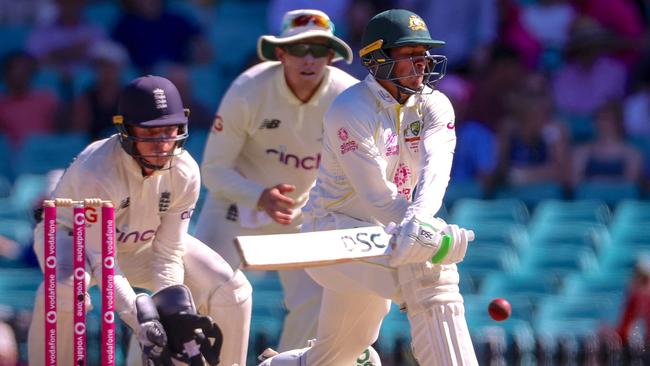
But the numbers show that Khawaja is one of the better batsmen of his generation and the fact he has played significantly fewer Test matches than his contemporaries indicates he has been dealt a pretty rough deal by selectors throughout his career.
Khawaja’s historic back-to-back hundreds at the SCG has put him in elite company as one of only 10 international batsmen to have scored 10 career hundreds or more since 2015.
The left-hander has converted to triple figures at a better rate per innings than the likes of David Warner, Azhar Ali, Joe Root and Cheteshwar Pujara – yet he has played only 36 Tests in that period, when most others on the list have played 20 or 30 more.
According to Cricinfo, Khawaja has missed 30 Tests since 2015, an eye-watering number compared to the likes of Kane Williamson, Virat Kohli, Ali, Root, Pujara, Dimuth Karunaratne and Dean Elgar who have all been absent for only a single digit number of matches for their respective countries.
Steve Smith (10) and Warner (11) are the only other two who come close to Khawaja’s tally of 30 Tests on the sidelines, and that’s of course due to their ball tampering bans.
Khawaja averages 43 from 45 Tests, with not many Test batsmen averaging more than that in the modern era.
If anyone is owed a historical square up by selectors it would be Khawaja for the tough hand dealt for him since his debut way back in 2011.
“You can tell by the sentiment at the SCG, (people) felt he was hard done by being dropped on the 2019 Ashes,” said former Test star Simon Katich on SEN.
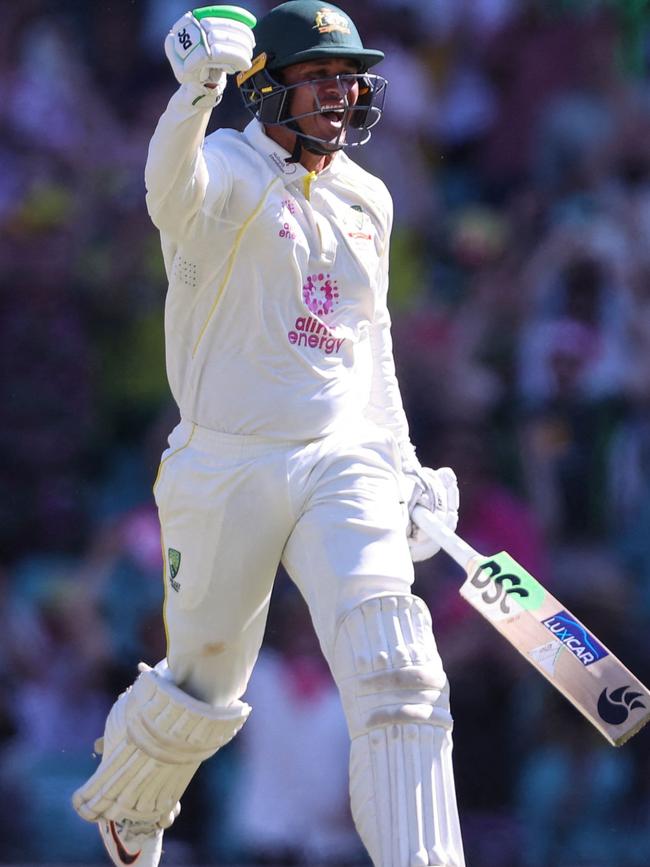

“Because there’s probably some inconsistencies with him paying the price with his spot in the team and other guys coming back to Australia and being able to keep their careers going.”
Khawaja has made another case to help out Harris and selectors by admitting that runs at No.5 don’t equate to the rigours of opening the batting.
He knows, as a former top three player for most of his career.
Katich is another who played the majority of his career at the top, but he also played 22 matches in the middle-order and is adamant the change in position is not reason enough to drop Khawaja for Hobart.
According to Katich, selectors have no choice but to reward Khawaja, both for his “rare” form and for his clear body of work as one of the world’s best.
“The case should have been closed for him to stay in the team for Hobart after the first innings, let alone a second hundred,” said Katich.
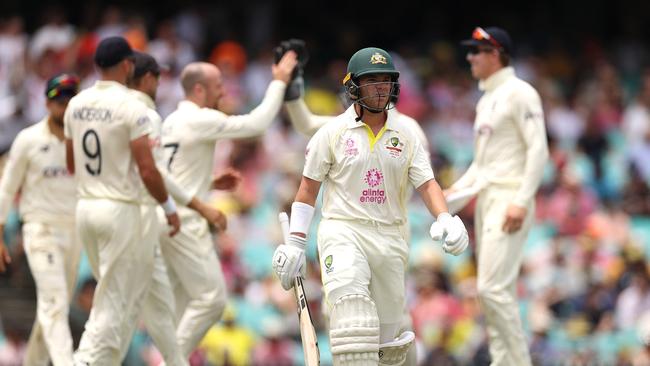
“He’s just in imperious form. And there’s no way they can leave him out for Hobart. No way.
“When he’s in this sort of form against pace, spin you name it. When he’s playing this confidently, he’s as good as anyone in the world
“(He should play at) the top of the order with Warner. It’s hard, because I think Marcus Harris has looked OK at times. I thought he was really good in Melbourne. But the reality is when you look at the two players and compare their overall records, they’re miles apart and this is not having a go at Marcus Harris by any means.
“We’ve been crying out for guys to put their hands up with the bat the past few years to back up Smith, Labuschagne and Warner and Khawaja has done.
“At the moment, our best top four is Warner, Khawaja, Labuschange and Smith.”
Crash: An opening reunion 28 years in the making
- Robert Craddock
Who would have thought it could happen - two seven-year-old opening bowlers going on to open for Australia in a Test together … as batsmen?
At age 35 if you don’t mind.
This could be the amazing reunion in Hobart next weekend if, as appears increasingly likely, Usman Khawaja gets posted to the top of the order to open with David Warner.
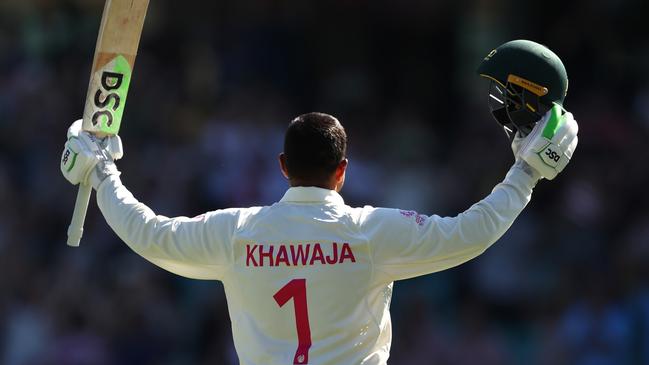
Back when they were in short pants, Khawaja and Warner used to open the bowling together in Sydney eastern suburbs junior teams as bustling medium pacers full of intent but lacking that killer yard of pace.
They played together in junior teams all the way up to under-16 level and have always had a solid friendship.
A smiling Warner was one of the last Australians to stop applauding Khawaja when he scored his second century of the SCG Test on Saturday.
“He hasn’t changed,’’ Khawaja said recently of Warner.
“Think Marnus on steroids and that was Davey back when we were kids.’’
Australia is likely to replacing stagnant opener Marcus Harris with Khawaja because the numbers demand it.
Travis Head is set to be recalled from a Covid-enforced absence, which is understandable given his progress this series.
But after twin centuries, Khawaja appears undroppable. And that would mean Harris would have to go.
Khawaja, who averages over 90 in limited outings as a Test opener, would be on trial for a prized opening berth on the Test tour to the country of his birth, Pakistan.

For all sorts of reasons – the most obvious being his form – there will be massive pressure on Australia to play Khawaja in Pakistan so they might as well find a place for him in Hobart.
The case against Harris is certainly strong enough to warrant his dismissal.
After 14 Tests he is averaging 25 and, while his last four scores of 23, 76, 38 and 27 show some progress, his overall numbers are modest, so Australia owes him no favours.
Chairman of selectors George Bailey said at the start of the series he wanted to give Harris a decent tilt at it and four Tests is that mark.
Harris has been superior to any opener seen from England this summer – that’s not saying much – and he has never really shaken that reputation as a player who is vulnerable in the gully region.
Khawaja is in the form of his life and has looked a class above anything on display in Sydney.
In a world full of funky batting moves, he is a batting minimalist. He only moves when he has to but his game is tight and compact.
His mind is relaxed and free.
He has tightened up just outside off stump which was once a soft spot and his play against spin, once a conspicuous weakness, is now a strength.
CRASH: THE RADICAL REBIRTH OF ONE COOL CAT
Robert Craddock
It’s amazing what sportsmen can achieve when they think it’s all over.
Age 35. Dumped from the Cricket Australia contract list. Batting down the list for Queensland.
“No problems,’’ thought Usman Khawaja. “I’ll just get on playing for Queensland and being a new dad. Happy days.’’
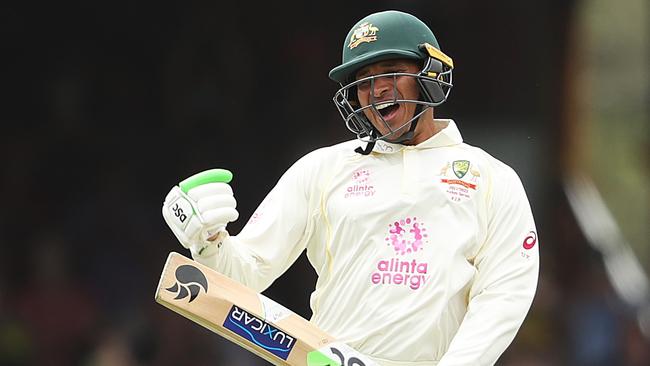
Then, suddenly, years of pent-up tension melted and he became a lighter man.
The stress over tight selection calls was gone. The politics, the pushes and the pecking orders had all faded into the horizon.
With all the distractions gone, a cool clarity appeared that has propelled him all the way to SCG glory.
It was fitting that Khawaja’s century included one sumptuously timed reverse sweep because that quirky stroke says everything about the man and his journey.
Cheeky, unconventional, going the other way to which you are supposed to … that is the reverse sweep and that’s Khawaja.
It’s the perfect shot for a man who regularly asks of cricket’s crusty traditions “so why do we actually do it this way?’’
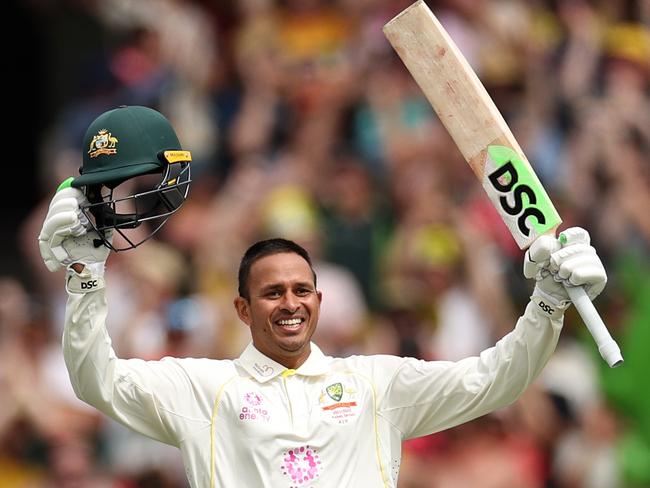
The remaking of Khawaja as a batsman has been an interesting affair in which one of cricket’s coolest cats had to be prepared to look anything but.
Knowing he had to remodel his game against spin, Khawaja went to the nets a few years ago to learn the reserve sweep and, for a while, balls flew in all sorts of crazy directions.
It wasn’t pretty. Khawaja, normally so soft on the eye, admitted for a while he “felt like an idiot.’’
But he got there.
It was a major step forward because it was also a man getting out of his own road and realising he had to get down and dirty to improve himself.
The fluent way in which he played English spinner Jack Leach at the SCG was in stark contrast to the issues he had with another English spinner, Graeme Swann, early in his career.

It took Khawaja a long time to find himself as a person. There are many players of Asian heritage coming through the system now but Khawaja well remembers when it felt as if it was just him.
He was constantly told as a young player that he would struggle to succeed in what was essentially a white man’s game.
During an interview with Fairfax a few months ago, he even admitted there were times as a youngster when he wished he had white skin. As a non-drinker in a big-drinking game, he at times felt the odd man out.
It weighed heavily on him and why he is currently a staunch campaigner for more multiculturalism in cricket.
A few years ago Khawaja decided just to be himself. He loves the showmanship of American sport and his high stepping celebration after making three figures was very much from the American sports playbook.
Khawaja grew up a couple of streets away from the SCG and used to watch sessions after tea when admission was free.
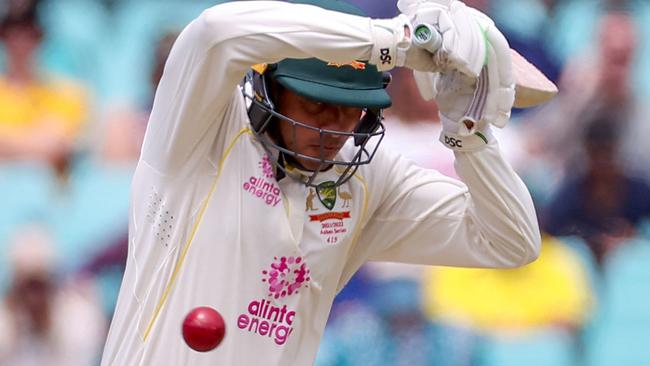
Much has been made of Scott Boland’s MCG heroics and what it might do for Indigenous cricketers, but Khawaja’s message is just as powerful for the many players of Asian heritage.
Khawaja could become a vital ally for new captain Pat Cummins, for every skipper needs that bold voice brave enough to tell you things you don’t really want to hear.
More Coverage
Originally published as Ashes 2021/22: Telling stats show why Usman Khawaja simply can’t be overlooked for Hobart Test




